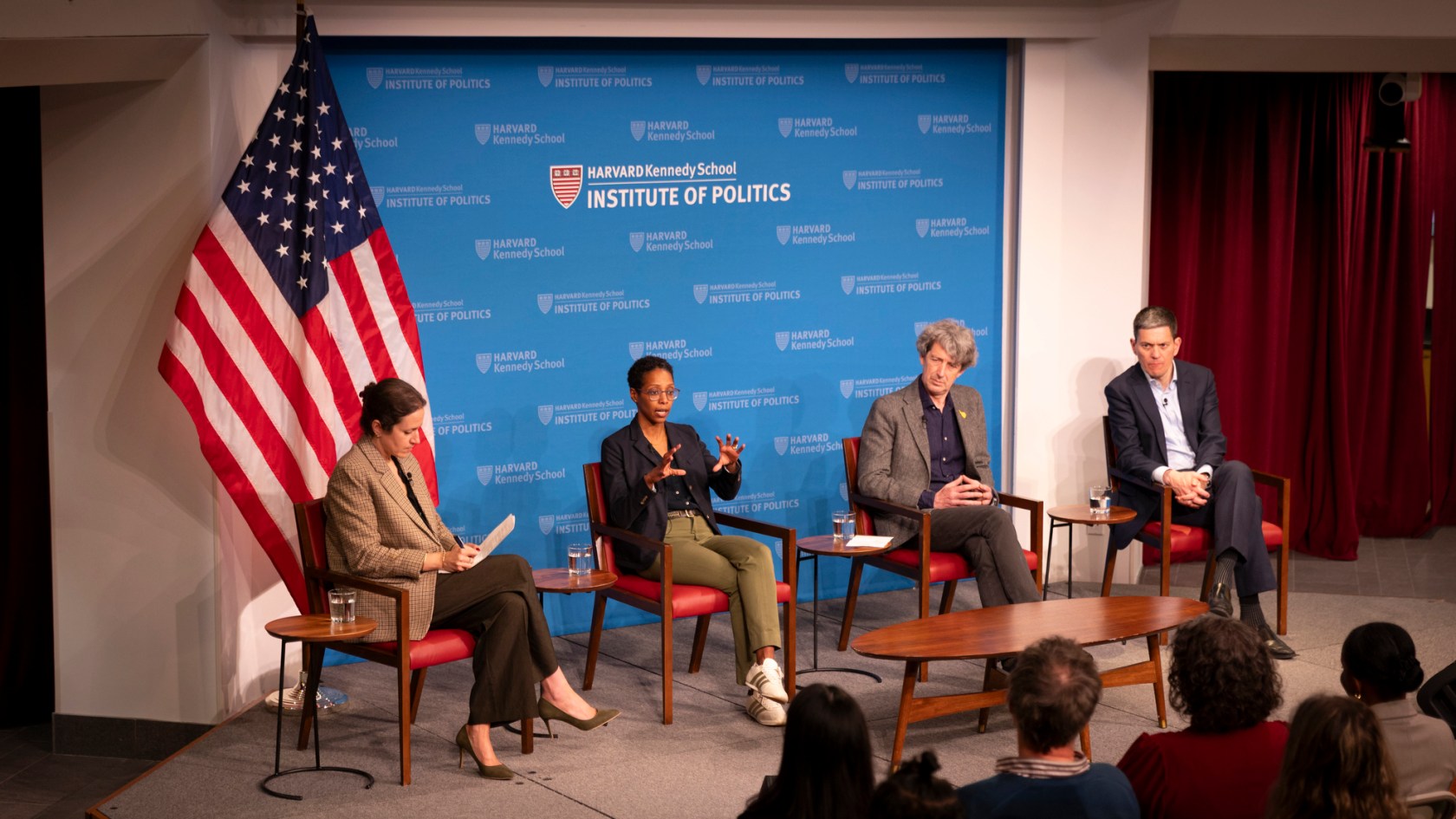
Zoe Marks (from left), Mai Hassan, Alex de Waal, and David Miliband.
Niles Singer/Harvard Staff Photographer
New, bigger humanitarian crisis in Darfur. But this time, no global outcry.
Regional specialists sound alarm, say displacement, starvation affect many more than two decades ago.
Between 2003 and 2005, Sudan’s Darfur region captured the world’s attention as the government, amid a civil conflict, carried out a campaign of mass killing against an estimated tens of thousands of ethnic Darfuri.
Nearly 20 years later, the country has plunged into another civil war that has led to the world’s largest humanitarian crisis, with around 25 million people, half of Sudan’s population, experiencing acute hunger and 12 million displaced from their homes, according to the U.N.’s World Food Program.
But this time, the international community is not paying attention, decried experts on Sudan during a panel on April 15, “Sudan in Crisis: A Civil War, Humanitarian Emergency, and the Consequences for a Nation and Region,” hosted by the JFK Jr. Forum’s Institute of Politics. The event was moderated by Zoe Marks, Oppenheimer Faculty Director of the Center for African Studies at Harvard.
“This is an awful crisis, and just not enough light has been shed on it,” said Mai Hassan, faculty director of MIT-Africa. “It’s an understatement to say Sudan is in crisis or that Sudan is under fire. Over 150,000 people have died in this conflict. More than 10 million have been displaced, and more than 10 million are facing dire levels of hunger or starvation.”
“It’s an understatement to say Sudan is in crisis or that Sudan is under fire.”
Mai Hassan, MIT-Africa
The two-year ongoing conflict between the Sudanese Armed Forces (SAF) and the paramilitary Rapid Support Forces (RSF) has claimed the lives of 150,000 people and shows no signs of winding down. Hamid El-Bashir, a development expert originally from Sudan who participated remotely from Washington, D.C., lamented the international community’s apathy and indifference.
“When you look at the international response to the crisis in Sudan, there is no response,” said El-Bashir. “I attended the General Assembly a few months ago, and I came out with this conclusion: Sudan is going to collapse … There is no attention to this country.”
Twenty years ago, the global advocacy movement “Save Darfur” mobilized a worldwide response to condemn the atrocities and spearhead peace efforts in the region. In 2004, the U.S. government accused the government of Sudan and pro-government Arab militias before the U.N. Security Council of committing genocide.
Alex de Waal, executive director of the World Peace Foundation, recalled a visit he made then to Harvard to talk about the Darfur genocide, which became the first genocide of the 21st century.
“I remember being in this forum 20 years ago,” said de Waal. “There was a really vibrant movement on this campus, and other campuses, saying, ‘Save Darfur’ and ‘Never Again’ to genocide. What has happened to that passion, that commitment? And the celebrities who were so active then. They’re all silent now.”
Located in northeast Africa, Sudan is among the continent’s largest countries and boasts a strategic location bordering Egypt to the north and the Red Sea to the east. Sudan’s civil war has spilled over the region, with thousands of refugees having fled to South Sudan, Chad, and Egypt. The conflict is being fueled by regional powers supporting Sudan’s warring factions, which could further destabilize the region, said David Miliband, president and CEO of the International Rescue Committee.
“It’s not as simple as a unified SAF and a unified SAF force, both of which came out of the Sudanese armed forces,” said Miliband. “There is a constellation of forces supporting each side. The United Arab Emirates, the kingdom of Saudi Arabia, Turkey, Russia, Iran, Egypt are all in there supporting different sides, and they’re supporting them sufficiently that both sides think that they can win, and that there’s no reason to stop.”
One student asked for suggestions on how to rally international support to stop the civil war. The panelists highlighted the need to support humanitarian aid, start a widespread movement to demand a ceasefire, and begin a peace process that involves civilians, the United Nations, and Middle Eastern powers.
There needs to be pressure on the regional powers that are fueling the conflict, too, said Miliband, but the first step is to provide humanitarian aid. A community-led initiative formed in Sudan in 2019, the Emergency Response Rooms has sprung into action since the conflict started.
“First of all, you’ve got to stop things getting worse,” said Miliband. “Stopping the slide is very important. I always say humanitarian aid is the first step on the road to development. Unless you can stop things from getting worse, unless you stop the bleeding, we’re going to lose more people, and every bloodshed leads to further danger.”
For MIT-Africa’s Hassan, the situation is dire and requires international action. She remains hopeful that Sudanese civil society will rise up again despite the challenges.
“What’s awful about the situation, not only the actual empirics of it, but that it comes on the heels of a euphoric popular revolution that overthrew a despised Islamist regime,” said Hassan, referring to the 2019 military coup, which took place after a year of massive protests that deposed dictator Omar al-Bashir, who was in power for 30 years.
“I’m hopeful that civil society will be mobilized again in some fashion to help bring some kind of legitimacy to whatever new state emerges or when a peaceful resolution comes about,” said Hassan. “It’s going to involve a popular mobilization. I think civil society can be mobilized again.”




